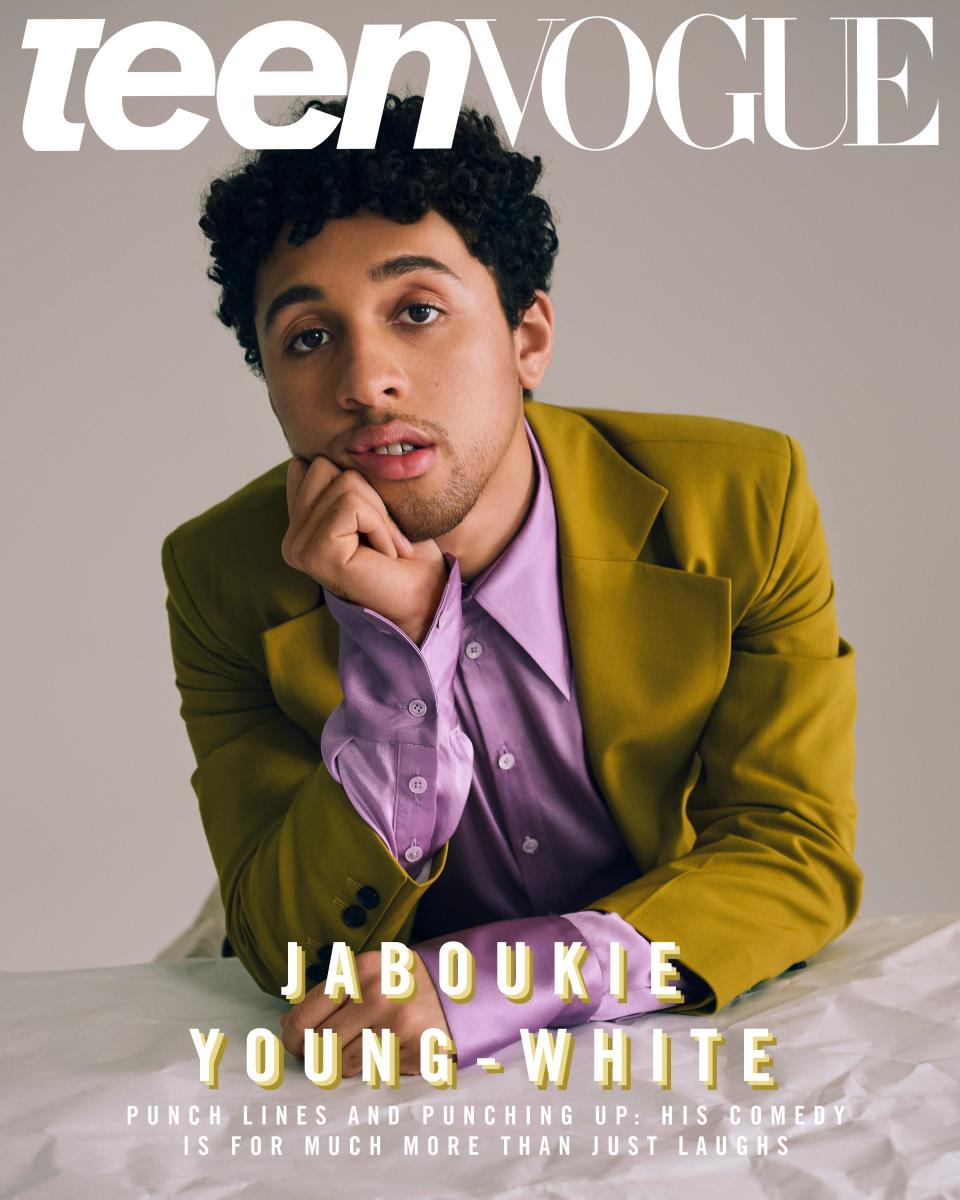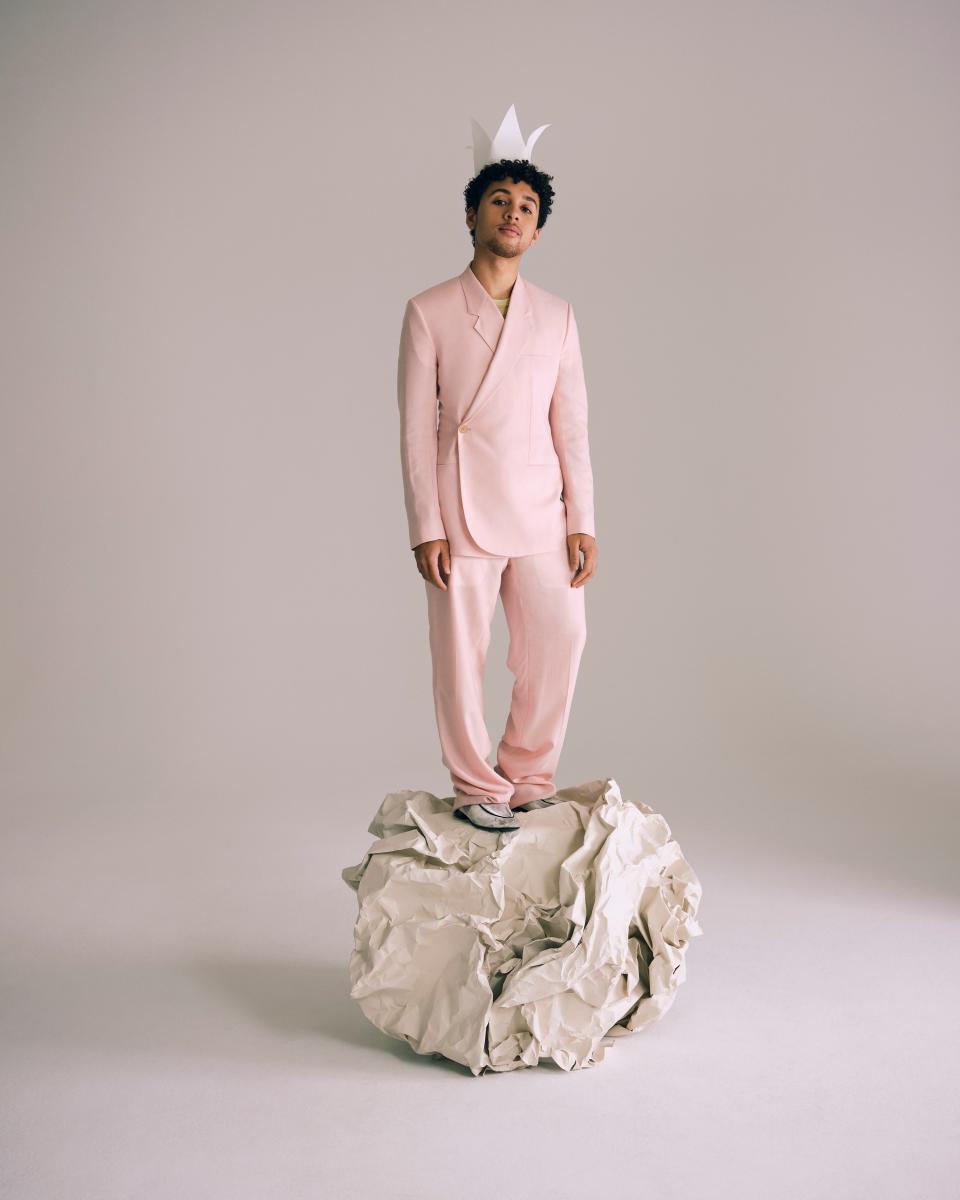Jaboukie Young-White’s Young Hollywood 2019 Interview on the Challenge of The Daily Show , Diversity in Writers Rooms, and Comedy as a Political Act
The first time Jaboukie Young-White did stand-up, he was 19 years old and so nervous he could barely speak, instead muttering quietly into the mic. The young comedian says it went so poorly that he didn’t do stand-up for another year or two. But thank the heavens (and one of Jaboukie’s friends for giving him some tough love about not giving up) that it wasn’t the last time he’d give it a go.
Five years later and Jaboukie has accomplished what most comedians only dream about. He has likely popped up on your Twitter timeline on more than one occasion with his hilarious musings on Steve Bannon and Harry Potter, being a short king, and more. The Tonight Show Starring Jimmy Fallon has invited him to perform stand-up not once but twice. Jaboukie, who was born and raised just outside of Chicago, has worked on two of the most genius Netflix series around, American Vandal and Big Mouth. And just this past year, Jaboukie was hired as a correspondent on The Daily Show, where he has tackled topics such as why young people don’t vote and Trump’s relationship with Mexico with deft wit and humor.
It may be Jaboukie’s job to make people laugh. But with much of his comedy, he’s hoping to make you think a bit more about the world we live in. As part of Teen Vogue’s Young Hollywood Class of 2019, he opened up about wanting to see more queer stories told in entertainment, transitioning between stand-up and television, and why a joke is sometimes the best way to get into the head of a closed mind.

Teen Vogue: What parts of who you are as a performer do you hope to see more of in Hollywood?
Jaboukie Young-White: I’m really excited to see stories coming from queer people and people of color that are able to explore our humanity outside of suffering and being the victim. I feel like we have so much more to offer than the sh*tty things people do to us. You know what I mean? I'm just interested in seeing more of our full humanity depicted in Hollywood.
TV: What has been the biggest challenge to proving yourself in Hollywood?
JY-W: The thing is, in Hollywood everyone loves youth. At the same time, they discredit you and they're like, "You don't know anything, you don't have enough experience." Just being young, you have so many points at which you have to sort of betray your age and show a competency that's beyond your years. I don't f*ck around with being late, just because I know that people already have this image of you're young. When I first started doing stuff seriously, I was 22. People were like, "Oh, he's 22. He's still in this college mindset." It's trying to break people of that idea of you that can be really hard.
TV: What do you hope young people learn from the kinds of projects you've worked on?
JY-W: I hope people can learn that if you're willing to dedicate yourself and put in the work, something can happen even from a nothing meeting. For me, I didn't really have family that was in entertainment. I didn't really grow up with an uncle that's a TV writer or something, so I didn't even know that it was possible at all. I slowly learned more about it and ended up here. I want people to not be discouraged by the fact that they don't have a legacy in Hollywood that's bringing them in. I know for me, and I'm sure other people, they don't come from Hollywood families. That's something that I really want to encourage [in] people: Don't be deterred from that.
TV: You might be working on these big movies and appearing on television, but a lot of the time comedians are still doing stand-up gigs at smaller venues. How do you balance traveling between these worlds?
JY-W: It will humble you so fast. Doing The Daily Show, it's in a live studio audience and they're so excited to be there. The crowd is really hot. I'll go from that to performing at a basement show in Brooklyn where everybody has worked retail all day and are super tired and kind of grouchy. It will just bring you right back down and be like, right, you are just a person at the end of the day. The recalibration can be hard. Sometimes it'll take a couple sets to get back into it. I'm just now starting to expand and do bigger things. I feel like the trick I'm getting into now is being aware of the environment and what the space is and what each performance requires from me and what the audience is expecting.
TV: How has it been working on The Daily Show?
JY-W: My favorite — and the most challenging — part is that it really is five jobs in one. You do sketch, you do on-camera, in-studio stuff, you do field pieces, you do writing. It's so many different things at once, which is so exciting. At the same time, it is very challenging. That is what I got into comedy for, to be able to challenge myself and just grow as a comedian and find new ways to be funny.
TV: Over the past couple of years, it feels like comedy has become an essential tool to talk about our current political landscape. What have you learned about the politicization of a joke?
JY-W: There’s an infectiousness to comedy. It's meant to be shared and spread, so I feel like any message that you're talking about through the vehicle of comedy is going to get further than if you just straightforwardly said it. So much of this sh*t now is just so abjectly terrible that there's no other way to engage with it besides putting a spin on it or a laugh. Because so many people will just not hear it any other way because it's a lot to handle at times. It acts as a filter to cut some of the edge off so people can still take in the message or still hear what needs to be said.
TV: With all the talk of diversity in Hollywood, a lot of times writers rooms can still be extremely homogeneous. Why is it vital that diversity extends behind the camera?
JY-W: For those talks to actually be serious and to effect change instead of just [being] marketing tools, you have to incorporate people behind the scenes. Which means incorporating queer people, women, women of color, people of color, queer people of color, queer women of color. Literally all of it. There are certain views and ways that you see the world that someone who has an identity different than yours just simply will not have. That's valuable.
That's something I think Big Mouth did really well. There's this rotation of writers that comes in and there's a core group of writers. We also had sex-ed specialists come in and talk to us. I think understanding that having diverse faces is great and important, and that helps, but also you need diverse minds and people who think differently from each other. That's so, so, so important and just as, if not even more, important than just having diverse faces in front of the camera.
TV: How do you keep your comedy feeling innovative and fresh?
JY-W: I just try to do things that make me excited. If I can find a way to surprise myself, then that's when I'm really excited to share something and really can stand behind it. I think it's that and just being aware of what I like in comedy and what I don't like, from things present and past, and just watching other people and being like, "I really like how they did this or this viewpoint or energy that they have toward this subject.” Also, after moving around so much, I've had so many funny friends who inspire me to just keep going. It's really just surrounding myself with funny people and trying to make myself laugh.

Fashion stylist: Solange Franklin
Hairstylist: Dennis Gots
Makeup artist: Sarah Uslan
Manicurist: Holly Falcone
Set designer: Bryn Bowen
Location: Smashbox Studios L.A.
BTS content: Hannah Choi
Photo assistants: Maria Troncoso Gibbs, Cailan O'Connell, Jason Renaud
Fashion assistants: Christine Nicholson, Corey Cano
Set design assistants: Thomas Anderson, Molly Painter
The future of Hollywood is in good hands. Teen Vogue chose seven emerging actors who are paving the way to a better tomorrow. They're shattering stereotypes, bringing a new authenticity to their roles, and challenging age-old expectations. Say goodbye to the industry's tired ways and hello to our Young Hollywood Class of 2019, a group we'll be celebrating with at a party in partnership with Snapchat. Check out the rest of the group here.
Let us slide into your DMs. Sign up for the Teen Vogue daily email.

